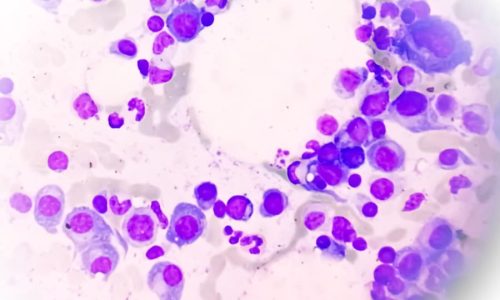
New Jersey Cancer Care Joins Regional Cancer Care Associates
Affiliation provides oncology practice with expanded resources as it pursues its commitment to providing patients with the latest therapies and best possible outcomes.
HIPAA Alert: Potential Data Breach Learn More
Questions on Oncology, Hematology and/or Infusion Clinical Services due to COVID-19 Crisis – CALL 833-698-1623
Important Information for Our Patients Regarding the Coronavirus.
RCCA Providing Area Cancer Patients with Access to Care During Coronavirus Outbreak
RCCA Offering Patients Virtual Visits During Coronavirus Pandemic

Cancerous myeloma cells prevent normal blood cells from growing. The resultant reduced number of healthy red blood cells, white blood cells, and platelets eventually can result in a range of symptoms. However, multiple myeloma can be difficult to diagnose in its early stages because symptoms are often not apparent until the blood cancer has progressed. Patients often do not display any symptoms at first, and some signs that point toward multiple myeloma might also be seen in other conditions, further complicating early recognition. General symptoms of multiple myeloma include bone pain, back pain, unexplained weight loss, constipation, and feelings of weakness in the legs. Other symptoms stem from complications related to multiple myeloma. These include:
This complication stems from low hemoglobin levels due to the loss of red blood cells. Hemoglobin is a substance that brings oxygen from the lungs to other parts of the body via its presence in red blood cells. Symptoms of anemia include shortness of breath, fatigue, and feelings of weakness.
Multiple myeloma can cause masses to develop in bone marrow that impact the structure of surrounding, healthy bones. It also stimulates cells that break down bone, leading to lytic lesions, which are small holes that reduce bone strength.
The loss of white blood cells means many people with multiple myeloma have a weakened immune system. White blood cells are responsible for fighting off infections, so with fewer of these cells in the body, patients become more vulnerable to infection.
Platelets are essential for blood clotting and blood vessel repair. The body usually produces millions of platelets every day, but in someone with multiple myeloma, this amount declines. Low platelet counts, also called thrombocytopenia, impede blood cells from clotting, causing increased blood loss and bruising from mild cuts and injuries.
Multiple myeloma causes the excess production of ineffective M proteins, which crowd out the development of healthy cells. This buildup of M proteins, as well as calcium, exhausts the kidneys as they filter blood. The result is diminished kidney function. In severe cases, if the kidneys can no longer filter waste from blood, the patient experiences kidney failure.
Because early-stage kidney disease often does not cause symptoms, patients may not be aware of impaired kidney function until they notice significant problems once kidney disease has progressed. One sign is urinating less frequently than usual.
Because it causes bone deterioration, multiple myeloma can increase calcium levels in the blood. This complication is called hypercalcemia. If a doctor detects hypercalcemia, the patient needs treatment as soon as possible. Serious cases of hypercalcemia can lead to cardiac arrest or coma. Symptoms of hypercalcemia include increased thirst and urination, loss of appetite, cognitive impairment, nausea and vomiting, and feelings of restlessness.
Research into how multiple myeloma develops is ongoing. As with other cancer types, each case of multiple myeloma presents differently, and people of various racial/ethnic backgrounds may experience this blood cancer. Medical researchers have identified certain genetic mutations that are responsible for multiple myeloma. However, unlike traits passed down genetically within families, these mutations seem to occur spontaneously in the body. Risk factors for multiple myeloma include:
Multiple myeloma is categorized into different stages based on the extent of its spread. Cancer is easier to treat when localized. With multiple myeloma, “localized” means only one tumor is detected in or outside the bone. When cancer spreads and many tumors develop in and outside the bone, multiple myeloma becomes harder to treat, and survival rates drop. For this reason, early detection and treatment of multiple myeloma is critical. Treatment can help patients manage symptoms and experience relief, as well as slow the progression of cancer. Treatments include:
Chemotherapy treatments provide patients with powerful medications that attack and destroy cancer cells. This treatment has a range of applications for treating cancer, from containing the spread of disease to relieving pain to shrinking tumors before the patient undergoes surgery or radiation therapy. In multiple myeloma, chemotherapy is seldom administered by itself. Instead, patients receive it alongside other treatments. While most patients receive chemotherapy drugs intravenously, others may take them orally, via injection, or as topical treatments.
Targeted therapy uses drugs designed to attack cancer cells directly and disrupt how they develop, preventing growth. The treatment is similar to chemotherapy, but in targeting cancer cells, it leaves more healthy cells intact. An adverse effect of chemotherapy is that some normal cells are killed along with the abnormal cells.
Radiation therapy utilizes high-energy beams to kill cancer cells or stop their growth. There are several types of radiation, including external and internal radiation and radioactive drugs. External radiation delivers high-energy rays directly into the affected area. With internal radiation, the patient either goes under anesthesia or the affected area is numbed. The radiation oncologist then will insert a container with radioactive material into the body. Radiation therapy may also be administered orally or intravenously as radioactive drugs.
Stem cells are the blood-forming cells found in bone marrow. Multiple myeloma impacts the production of stem cells, and common treatments for blood cancer, such as radiation therapy and chemotherapy, also can negatively affect these cells. The result is diseased bone marrow.
Medical oncologists can correct this problem with stem-cell transplantation. With this treatment, medical oncologists collect these blood-forming cells from the patient’s circulating blood before administering a treatment to kill cancer cells. After that treatment, they inject the stem cells back into the patient’s bloodstream, and these cells travel to the bone to produce healthy bone marrow.
Additional approaches to treating multiple myeloma include:
In addition to medical treatment, making changes to lifestyle habits can provide symptom relief and slow cancer’s progression. These are some behaviors to adopt:
Patients are also advised to seek support for themselves and for loved ones. Most doctors and medical oncologists, such as those at Regional Cancer Care Associates, also offer cancer care support.
Being diagnosed with multiple myeloma can be overwhelming, and patients want to know they will receive care from knowledgeable providers who can determine and deliver the best treatments. At Regional Cancer Care Associates, patients find skilled and compassionate oncology and hematology specialists with experience treating all kinds of cancer and hematology conditions, including multiple myeloma. Regional Cancer Care Associates serves patients at multiple locations throughout New Jersey, Connecticut, Maryland, and the Washington, DC, area. Contact us to learn more about treatment for multiple myeloma or request an appointment at one of our locations today.
For more information or to schedule an appointment,
call 844-346-7222. You can also schedule an appointment by calling the RCCA location nearest you.

Affiliation provides oncology practice with expanded resources as it pursues its commitment to providing patients with the latest therapies and best possible outcomes.

Commitment, dedication and passion are attributes that show through in every aspect of care at Regional Cancer Care Associates.

Recent research has caused many healthcare professionals to reconsider their approach to screening men for prostate cancer. That’s because the disease (already the second most

Regional Cancer Care Associates is one of fewer than 200 medical practices in the country selected to participate in the Oncology Care Model (OCM); a recent Medicare initiative aimed at improving care coordination and access to and quality of care for Medicare beneficiaries undergoing chemotherapy treatment.